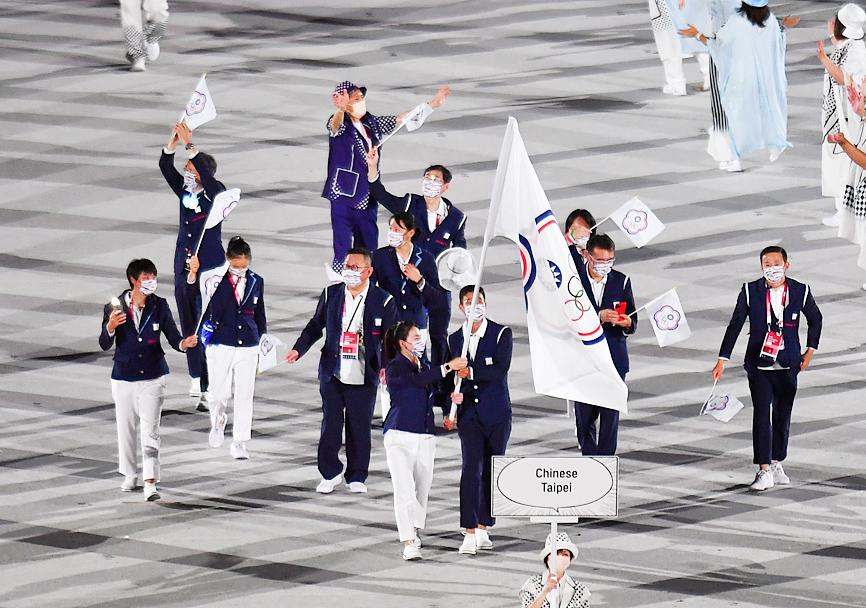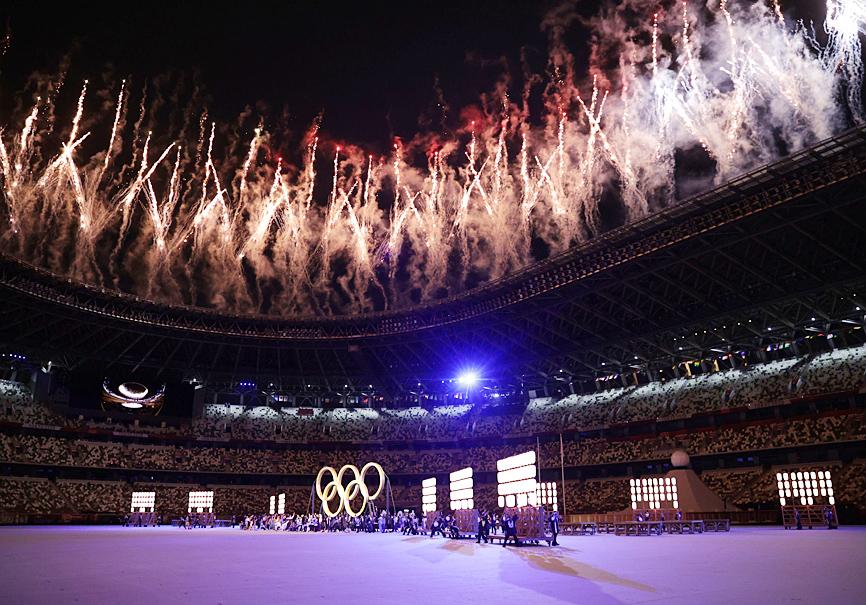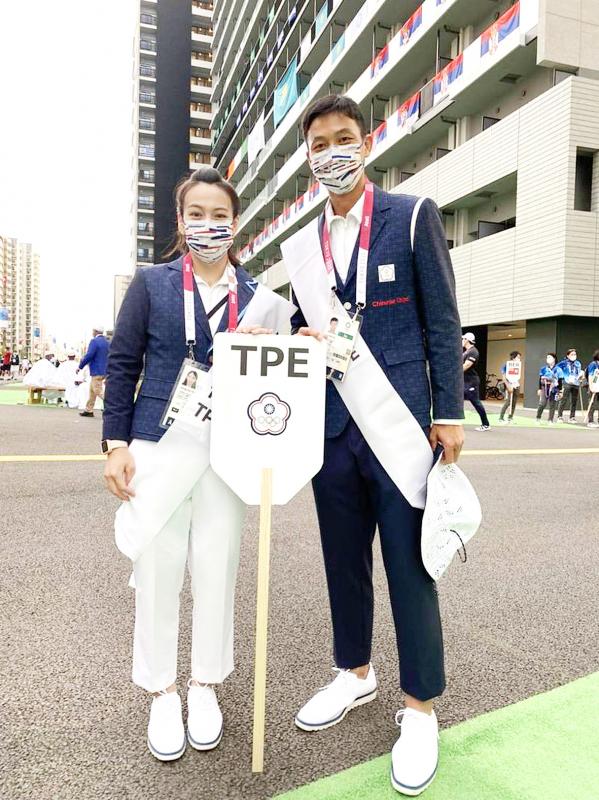The opening ceremony of the Tokyo Olympics took place yesterday in a nearly empty stadium after a year-long COVID-19-pandemic postponement and a build-up marred by scandal and controversy.
The stripped-back celebration began with a video showing athletes training at home during the pandemic, before fireworks burst into the air above the Olympic Stadium.
Just a few hundred officials and dignitaries were in the stands of the 68,000-seat venue, including French President Emmanuel Macron, US first lady Jill Biden and Japanese Emperor Naruhito, who would declare the Games open.

Photo: Lin Cheng-kung, Taipei Times
The Olympics have faced opposition in Japan over fears the global gathering of 11,000 athletes could trigger a super-spreader event, and is taking place under strict virus measures.
Overseas fans are banned for the first time in the history of the Games, and domestic spectators can only watch events at a handful of venues.
Athletes, support staff and media are subject to strict COVID-19 protocols, including regular testing and daily health checks. The restrictions made for an opening ceremony that was far from the usual exuberant celebration.

Photo: Reuters
Every athlete entered the stadium wearing a mask, and the national delegations of athletes marching around the stadium were far smaller than usual, ranging from just a handful of people to a few dozen.
The ceremony wove together references to Japan’s traditional crafts and its globally adored video games, with athletes entering to theme music from famed titles.
Polls have consistently shown that Japanese are opposed to holding the Games during the pandemic, but hundreds of people still gathered outside the stadium and cheered as the fireworks exploded overhead.

Photo courtesy of the Chinese Taipei Olympic Committee
Mako Fukuhara arrived six hours before the ceremony to grab a spot.
“Until now it didn’t feel like the Olympics, but now we are by the stadium, it feels like the Olympics,” she said as people snapped selfies nearby.
Inside, fewer than 1,000 dignitaries and officials were in the stands, and in a sign of how divisive the Games remain, several top sponsors including Toyota and Panasonic did not attend the ceremony.
Small groups of protesters demonstrated against the Games outside the stadium as the ceremony began, but their chants were drowned out as the music started.
Tokyo is battling a surge in virus cases, and is under emergency measures that mean bars and restaurants must shut by 8pm and cannot sell alcohol.
Olympic officials have put a brave face on the unusual circumstances, with International Olympic Committee (IOC) president Thomas Bach insisting that canceling the Games was never on the table.
“Over the past 15 months we had to take many decisions on very uncertain grounds,” he said this week. “We had doubts every day. There were sleepless nights.”
“We can finally see at the end of the dark tunnel. Cancelation was never an option for us,” he said. “The IOC never abandons the athletes ... we did it for the athletes.”

A Chinese aircraft carrier group entered Japan’s economic waters over the weekend, before exiting to conduct drills involving fighter jets, the Japanese Ministry of Defense said yesterday. The Liaoning aircraft carrier, two missile destroyers and one fast combat supply ship sailed about 300km southwest of Japan’s easternmost island of Minamitori on Saturday, a ministry statement said. It was the first time a Chinese aircraft carrier had entered that part of Japan’s exclusive economic zone (EEZ), a ministry spokesman said. “We think the Chinese military is trying to improve its operational capability and ability to conduct operations in distant areas,” the spokesman said. China’s growing

Nine retired generals from Taiwan, Japan and the US have been invited to participate in a tabletop exercise hosted by the Taipei School of Economics and Political Science Foundation tomorrow and Wednesday that simulates a potential Chinese invasion of Taiwan in 2030, the foundation said yesterday. The five retired Taiwanese generals would include retired admiral Lee Hsi-min (李喜明), joined by retired US Navy admiral Michael Mullen and former chief of staff of the Japan Self-Defense Forces general Shigeru Iwasaki, it said. The simulation aims to offer strategic insights into regional security and peace in the Taiwan Strait, it added. Foundation chair Huang Huang-hsiung

PUBLIC WARNING: The two students had been tricked into going to Hong Kong for a ‘high-paying’ job, which sent them to a scam center in Cambodia Police warned the public not to trust job advertisements touting high pay abroad following the return of two college students over the weekend who had been trafficked and forced to work at a cyberscam center in Cambodia. The two victims, surnamed Lee (李), 18, and Lin (林), 19, were interviewed by police after landing in Taiwan on Saturday. Taichung’s Chingshui Police Precinct said in a statement yesterday that the two students are good friends, and Lin had suspended her studies after seeing the ad promising good pay to work in Hong Kong. Lee’s grandfather on Thursday reported to police that Lee had sent

A Chinese ship ran aground in stormy weather in shallow waters off a Philippines-controlled island in the disputed South China Sea, prompting Filipino forces to go on alert, Philippine military officials said yesterday. When Philippine forces assessed that the Chinese fishing vessel appeared to have run aground in the shallows east of Thitu Island (Jhongye Island, 中業島) on Saturday due to bad weather, Philippine military and coast guard personnel deployed to provide help, but later saw that the ship had been extricated, Philippine navy regional spokesperson Ellaine Rose Collado said. No other details were immediately available, including if there were injuries among